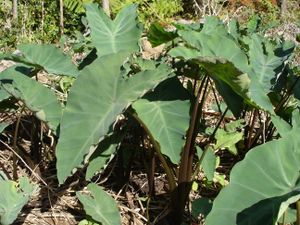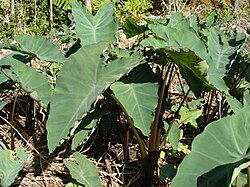Note: This is a project under development. The articles on this wiki are just being initiated and broadly incomplete. You can Help creating new pages.
Colocasia esculenta - Aaluki, Green Taro
Aaluki or Taro commonly refers to the plant Colocasia esculenta. The most widely cultivated species of several plants in the Araceae family which are used as vegetables for their corm, leaves, and petioles.
Contents
[hide]- 1 Uses
- 2 Parts Used
- 3 Chemical Composition
- 4 Common names
- 5 Properties
- 6 Habit
- 7 Identification
- 8 List of Ayurvedic medicine in which the herb is used
- 9 Where to get the saplings
- 10 Mode of Propagation
- 11 How to plant/cultivate
- 12 Commonly seen growing in areas
- 13 Photo Gallery
- 14 References
- 15 External Links
Uses
Ear ache , Otorrhoea, Internal hemorrhages, Inflamed glands, Buboes, Asthma, Piles, Diarrhea[1]
Parts Used
Chemical Composition
The bioactive constituents and antioxidant activities of raw, fried and decoctions of cocoyam (Colocasia esculenta) tubers were investigated.[2]
Common names
| Language | Common name |
|---|---|
| Kannada | ಕೇಸವೆ Kesave |
| Hindi | Arvi, Ashukachu |
| Malayalam | Chempu, Chempakizhanna |
| Tamil | Sempu, shamakkilangu |
| Telugu | Chamadumpa, Chamagadda |
| Marathi | Alvancha kanda |
| Gujarathi | Alavi |
| Punjabi | Gagli |
| Kashmiri | NA |
| Sanskrit | Dalasarini |
| English | Taro, cocoyam, Green taro |
Properties
Reference: Dravya - Substance, Rasa - Taste, Guna - Qualities, Veerya - Potency, Vipaka - Post-digesion effect, Karma - Pharmacological activity, Prabhava - Therepeutics.
Dravya
Rasa
Guna
Veerya
Vipaka
Karma
Prabhava
Habit
Identification
Leaf
| Kind | Shape | Feature |
|---|---|---|
| Simple | Non-Palm Foliage (Cordate) | Foliar Venation is Pinnate / Net and Foliar Margin is Entire - Wavy / Undulate |
Flower
| Type | Size | Color and composition | Stamen | More information |
|---|---|---|---|---|
| Unisexual | 4-10cm long | Yellow / Golden | 5-10 | Flower Grouping is Cluster / Inflorescence and Inflorescence Type is Spathe & Spadix. Flowering from September to October |
Fruit
| Type | Size | Mass | Appearance | Seeds | More information |
|---|---|---|---|---|---|
| Round | Clearly grooved lengthwise, Lowest hooked hairs aligned towards crown | With hooked hairs | Fruiting from September to October |
Other features
List of Ayurvedic medicine in which the herb is used
- Vishatinduka Taila as root juice extract
Where to get the saplings
Mode of Propagation
How to plant/cultivate
Taro is a plant of the moist to humid tropics, where it can be grown at elevations up to 2,700 metres.[5]
Commonly seen growing in areas
Trophical areas, Humid region.
Photo Gallery
References
- ↑ Jump up to: 1.0 1.1 Karnataka Medicinal Plants Volume - 2” by Dr.M. R. Gurudeva, Page No.216, Published by Divyachandra Prakashana, #45, Paapannana Tota, 1st Main road, Basaveshwara Nagara, Bengaluru.
- Jump up ↑ Bioactive constituents
- Jump up ↑ Common names
- Jump up ↑ Mmorphology
- Jump up ↑ Cultivation Details
External Links
- Ayurvedic Herbs known to be helpful to treat Ear ache
- Ayurvedic Herbs known to be helpful to treat Otorrhoea
- Ayurvedic Herbs known to be helpful to treat Internal hemorrhages
- Ayurvedic Herbs known to be helpful to treat Inflamed glands
- Ayurvedic Herbs known to be helpful to treat Buboes
- Ayurvedic Herbs known to be helpful to treat Asthma
- Ayurvedic Herbs known to be helpful to treat Piles
- Ayurvedic Herbs known to be helpful to treat Diarrhea
- Herbs with Leaves used in medicine
- Herbs with Stem used in medicine
- Herbs with All parts used in medicine
- Herbs with common name in Kannada
- Herbs with common name in Hindi
- Herbs with common name in Malayalam
- Herbs with common name in Tamil
- Herbs with common name in Telugu
- Herbs with common name in Marathi
- Herbs with common name in Gujarathi
- Herbs with common name in Punjabi
- Herbs with common name in Sanskrit
- Herbs with common name in English
- Habit - Evergreen Perennial
- Index of Plants which can be propagated by Seeds
- Herbs that are commonly seen in the region of Trophical areas
- Herbs that are commonly seen in the region of Humid region
- Herbs
- Ayurvedic herbs that don't have flower, fruit and leaf photos
- Ayurvedic herbs that don't have seed photos
- Araceae






